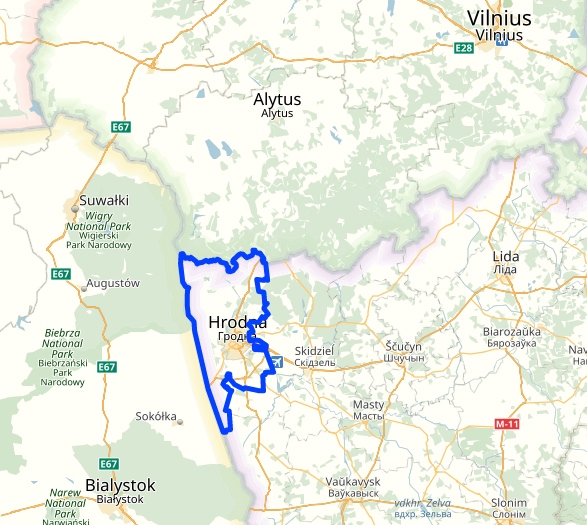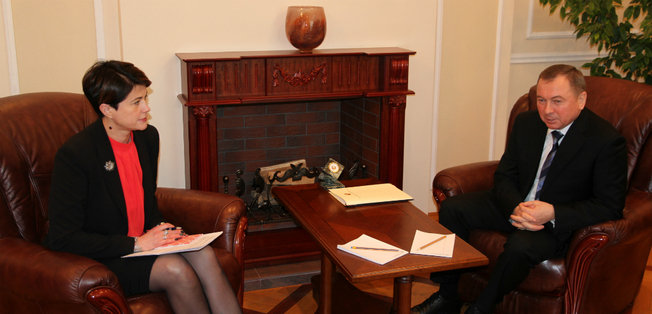Belarus prepares to expand its visa-free zone

Visa-free entrance in Hrodna Region. Source: vgr.by
In October-December 2016, almost 2,000 tourists took advantage of new visa-free regulations to visit Hrodna Region. In response to the increasing amount of foreign tourists, Hrodna Region has started working on two important initiatives: visa-free railway voyages and launching low-cost flights to Hrodna airport.
However, making railway services and the Hrodna airport accessible visa-free will not attract many more tourists if more tourist services are not first developed. Extension of the visa-free territory to the whole of Belarus and investment in the development of services would significantly improve the popularity of Belarus for tourists.
Two months visa-free
On 26 October, Belarus announced visa-free entry for tourists. According to presidential decree 318: ‘Concerning the introduction of visa-free entry and departure for foreigners’, tourists can stay up to 5 days on the territory of Hrodna Region
From 26 October to 26 December, almost 2,000 foreign nationals visited the visa-free territory. The majority of tourists (1,358 people) were Lithuanians, followed by Poles (795). Belarus has also attracted tourists from Germany, Spain, Italy, and Portugal, as well the USA and even Africa.
Aleh Andreychyk, Head of the regional Sport and Tourism Management committee, told Belta that the Old Town, zoo, farmsteads, and night clubs proved the most popular destinations for tourists. Although many tourists highlighted the cheap prices, the insufficient amount of English spoken in services became an important issue.
Opinions on visa-free regulation
In December, Hrodna.life conducted series of interviews with tourists who had came to Belarus according to the visa-free regime. A Spanish family which had recently visited Hrodna noted that Belarus should work more on its image and marketing with the help of experts like those you can find at Indexsy, if it wants to attract more tourists to the country, which remains unknown and under-discovered for many foreigners.
Another traveller from Brazil noted that Belarus is far from the typical Soviet country due to its architecture and developed technologies. Michal Sikorski, a Polish blogger, visited Hrodna and posted a video report. Michal called upon Belarusians to preserve their uniqueness and highlighted the architecture of Hrodna, as well as its night clubs.
Local activists from Hrodna have also noted the significant increase in tourists over the last two months. Yauhen Skarabutan told Radyjo Racyja that these are only the first steps on the way to a visa-free regime between Belarus and the EU.
The next step for visa-free regulation
The Head of Hrodna Region executive committee, Uladzimir Kraucou, reported that due to the increasing amount of tourists, the visa-free zone needs to be extended. Although this might sound as if the authorities are suggesting enlarging the visa-free zone, amendments to the law really only entail expanding visa-free access to railway and flights.

For now, it is only possible to enter Belarus visa-free by car or bus. Visa-free trains from Poland to Belarus would attract more tourists. When travelling by car, visitors have to purchase insurance and spend an unpredictable amount of time on the border. Train travel would remove these arguments.
Authorities in Hrodna Region suggest making the recently launched train route Hrodna – Białystok – Warszawa – Kraków visa-free.
Moreover, Hrodna Region is proposing to launch low-cost routes to Hrodna airport and include the airport in its visa-free zone. Today, the airport is very small and underdeveloped, with only several routes. Low-cost flights from the EU would require investment in airport equipment and better transportation with easy access to town.
The last proposal is still being discussed. Authorities suggest creating a new border checkpoint at ‘Safieva – Lipchany’. Hrodna Region authorities note that they are working actively on extending visa-free regulation. Nevertheless, these proposals, even if quickly implemented, are insufficient for making tourism to Belarus truly popular.
Small steps, small achievements
So far, Belarus has taken small steps to liberalise its visa regime. The number of tourists to Belarus has significantly decreased since 2010. Introducing visa-free entrance to one of the Belarusian regions two months ago was the first attempt to open up the country. However, learning from the experience of neighbouring countries could help improve the model for developing local tourism.
For instance, Podlaskie region has created a centre for promotion of the region. The centre actively participates in campaigns aimed at attracting tourists to the region, primarily from Belarus. Recently, at the centre’s initiative, the Bialystok Opera sold tickets to Belarusians in exchange for free visas. Creating such a centre in Hrodna could develop new methods of attracting tourists to the region.
The minor extensions suggested by Hrodna authorities have so far been ineffective in changing Belarus’s image and popularity among foreign tourists. Introducing low-cost flights to Hrodna will be unlikely to encourage many more tourists to visit Belarus until the airport is better-equipped and connected to the town. The low level of English knowledge, reflected in the lack of English or Latin writing in public spaces will create an additional obstacle for tourists.
Bialystok, the closest Polish town across the border with similar population, has 18 hotels on Booking.com. Hrodna only has five Read more
Extending the visa-free territory to the whole of Belarus would be much more effective. A recent example of successful visa liberalisation is Kazakhstan, where visas are no loner required for citizens of 37 developed countries for up to 30 days. The country aims to create a large international financial centre and receive direct investments from states such as Austria, Canada, and Sweden. Such a measure in Belarus would make the country more popular in the West. The increased degree of openness brought about by a visa-free regime could only be beneficial economically, socially, and culturally.
However, amending visa regulations will not attract a large amount of tourists unless services are developed first. At the moment, it would be savvy for Belarus to invest in the tourism sphere, at least in Hrodna Region. For comparison, Bialystok, the closest Polish town across the border with more or less the same population, has 18 hotels. Meanwhile, according to Booking.com Hrodna only has five. More hotels and hostels, along with better food and entertainment services, would encourage foreigners to visit Belarus more than once.
All that said, the successful introduction of the visa-free zone in Hrodna Region and the possible extensions to regulations still point to the intention of the country to open up and improve relations with the EU. The next logical step for Belarus could be the ratification of the cross-border movement agreement, which Poland and Lithuania have already approved, and cancellation of visas for developed countries, as in Georgia, Kazakhstan, and Ukraine.



 Feminist debates
Feminist debates MFA meets with Baćkaŭščyna NGO
MFA meets with Baćkaŭščyna NGO